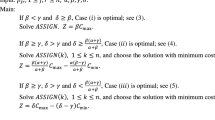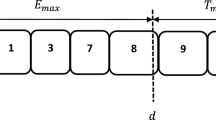Abstract
In our current fast-paced era, customers are often willing to pay extra premium for shorter lead times, which motivates further research on the scheduling problem with due-date assignment and customer-specified lead times. As part of this effort, we extend the classic minsum ‘DIF’ scheduling model to allow optional job-rejection, thus adding an important component of real-life applications, namely, the possibility that the scheduler decides to process only a subset of the jobs and outsource the disjoint set. The scheduler is penalised for rejecting certain jobs by setting job-dependent rejection costs, and he is limited by a given upper bound on the total rejection cost. The most general version of the minsum DIF problem includes job-dependent cost parameters and lead-times, and it is strongly NP-hard. Therefore, we study six variants of the problem, where either only the cost parameters or the lead-times are job dependent. All alternatives are extended by optional job-rejection that possibly bounds the constraints or the underlying cost functions. We establish that all studied problems are NP-hard in the ordinary sense and present pseudo-polynomial dynamic programming algorithms and extensive numerical studies for most solutions.
Similar content being viewed by others
Data availability
Data sharing not applicable to this article as no datasets were generated or analysed during the current study.
References
Cao, Z.G., Wang, Z., Zhang, Y.Z., Liu, S.P.: On several scheduling problems with rejection or discretely compressible processing times. Lect. Notes Comput. Sci. 3959, 90–98 (2006)
Du, J., Leung, J.Y.T.: Minimizing total tardiness on one machine is NP-hard. Math. Oper. Res. 15, 483–495 (1990)
Gerstl, E., Mor, B., Mosheiov, G.: Minmax scheduling with acceptable lead-times: extensions to position-dependent processing times, due-window and job rejection. Comput. Oper. Res. 83, 150–156 (2017)
Gerstl, E., Mosheiov, G.: Single machine scheduling problems with generalised due-dates and job-rejection. Int. J. Prod. Res. 55, 3164–3172 (2017)
Gerstl, E., Mosheiov, G.: Minmax due-date assignment with a time window for acceptable lead-times. Ann. Oper. Res. 211(1), 167–177 (2013)
Gerstl, E., Mosheiov, G.: Scheduling with a due-window for acceptable lead-times. J. Oper. Res. Soc. 66(9), 1578–1588 (2015)
Kacem, I.: Fully polynomial time approximation scheme for the total weighted tardiness minimization with a common due date. Discret. Appl. Math. 158, 1035–1040 (2010)
Kellerer, H., Strusevich, V.A.: A fully polynomial approximation scheme for the single machine weighted total tardiness problem with a common due date. Theoret. Comput. Sci. 369, 230–238 (2006)
Kianfar, K., Moslehi, G.: A note on “Fully polynomial time approximation scheme for the total weighted tardiness minimization with a common due date.” Discrete Appl. Math. 161, 2205–2206 (2013)
Lawler, E.L.: A “pseudopolynomial” algorithm for sequencing jobs to minimize total tardiness. Ann. Discrete Math. 1, 331–342 (1977)
Leyvand, Y., Shabtay, D., Steiner, G.: A unified approach for scheduling with convex resource consumption functions using positional penalties. Eur. J. Oper. Res. 206, 301–312 (2010)
Mor, B., Mosheiov, G., Shabtay, D.: A note: minmax due-date assignment problem with lead-time cost. Comput. Oper. Res. 40, 2161–2164 (2013)
Mor, B., Shapira, D.: Scheduling with regular performance measures and optional job rejection on a single machine. J. Oper. Res. Soc. 71(8), 1315–1325 (2020)
Mosheiov, G., Pruwer, S.: On the minmax common-due-date problem: extensions to position-dependent processing times, job rejection, learning effect, uniform machines and flowshops. Eng. Optim. 53(3), 408–424 (2021)
Seidmann, A., Panwalkar, S.S., Smith, M.L.: Optimal assignment of due-dates for a single processor scheduling problem. Int. J. Prod. Res. 19, 393–399 (1981)
Shabtay, D.: Scheduling and due date assignment to minimize earliness, tardiness, holding, due date assignment and batch delivery costs. Int. J. Prod. Econ. 123, 235–242 (2010)
Shabtay, D., Gaspar, N., Kaspi, M.: A survey on offline scheduling with rejection. J. Sched. 16, 3–28 (2013)
Shabtay, D., Steiner, G.: Two due-date assignment problems in scheduling a single machine. Oper. Res. Lett. 34, 683–691 (2006)
Shabtay, D., Steiner, G.: The single-machine earliness-tardiness scheduling problem with due-date assignment and resource-dependent processing times. Ann. Oper. Res. 159, 25–40 (2008)
Shabtay, D., Steiner, G.: Optimal due date assignment in multi-machine scheduling environments. J. Sched. 11, 217–228 (2008)
Steiner, G., Zhang, R.: Revised delivery-time quotation in scheduling with tardiness penalties. Oper. Res. 59, 1504–1511 (2011)
Yuan, J.: The NP-hardness of the single machine common due date weighted tardiness problem. Tabriz Univ. Ser. 5, 328–333 (1992)
Zhang, L., Lu, L., Yuan, J.: Single-machine scheduling under the job rejection constraint. Theoret. Comput. Sci. 411, 1877–1882 (2010)
Zhao, C., Yin, Y., Cheng, T.C.E., Wu, C.C.: Single-machine scheduling and due date assignment with rejection and position-dependent processing times. J. Indus. Manag. Optim. 10(3), 691–700 (2014)
Funding
The authors did not receive support from any organization for the submitted work.
Author information
Authors and Affiliations
Corresponding author
Ethics declarations
Conflict of interests
The authors have no relevant financial or non-financial interests to disclose.
Additional information
Publisher's Note
Springer Nature remains neutral with regard to jurisdictional claims in published maps and institutional affiliations.
Rights and permissions
About this article
Cite this article
Mor, B., Shapira, D. Minsum scheduling with acceptable lead-times and optional job rejection. Optim Lett 16, 1073–1091 (2022). https://doi.org/10.1007/s11590-021-01763-8
Received:
Accepted:
Published:
Issue Date:
DOI: https://doi.org/10.1007/s11590-021-01763-8




